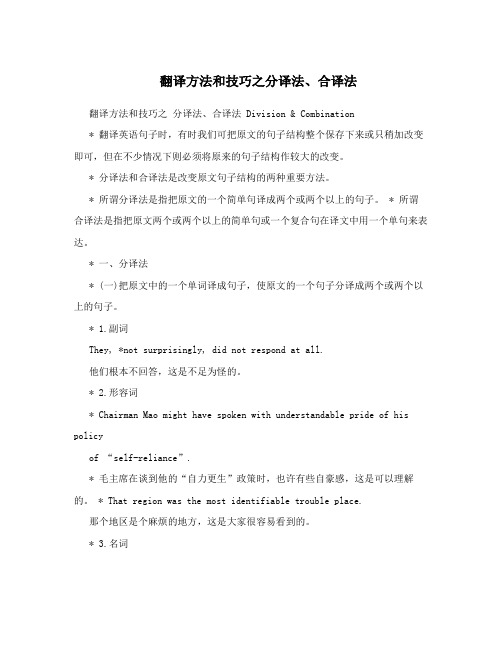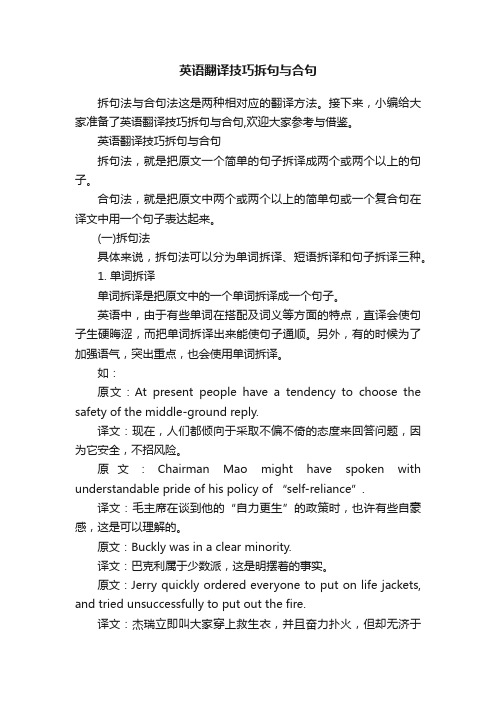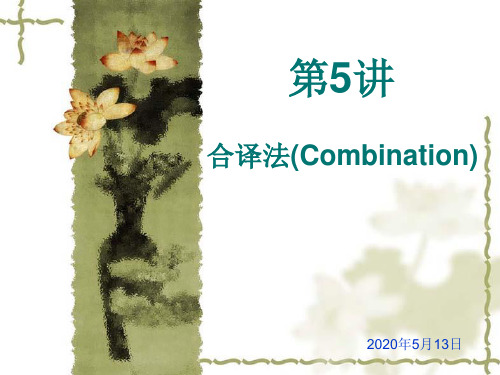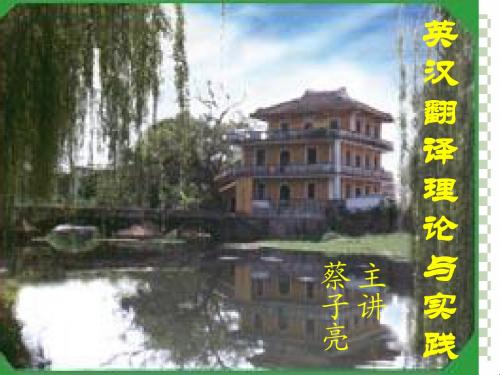复合句的译法
英语复合句的翻译方法

Literal translation can retain the rhetorical style, language features, and expression of the original text, making the translation more faithful to the original text and easy to understand.
01
When translating English compound sentences, attention should be paid to preserving the style and characteristics of the original text, such as rhetorical devices, tone, etc.
Grammar correctness
When translating compound sentences, attention should be paid to the correctness of grammar to ensure that the structure, tense, voice, and other aspects of the sentence are consistent with the original text.
The translator organizes the translated text to ensure a logical flow, using appropriate punctuation marks and presence structure
Preserving the original meaning
翻译方法和技巧之分译法、合译法

翻译方法和技巧之分译法、合译法翻译方法和技巧之分译法、合译法 Division & Combination* 翻译英语句子时,有时我们可把原文的句子结构整个保存下来或只稍加改变即可,但在不少情况下则必须将原来的句子结构作较大的改变。
* 分译法和合译法是改变原文句子结构的两种重要方法。
* 所谓分译法是指把原文的一个简单句译成两个或两个以上的句子。
* 所谓合译法是指把原文两个或两个以上的简单句或一个复合句在译文中用一个单句来表达。
* 一、分译法* (一)把原文中的一个单词译成句子,使原文的一个句子分译成两个或两个以上的句子。
* 1.副词They, *not surprisingly, did not respond at all.他们根本不回答,这是不足为怪的。
* 2.形容词* Chairman Mao might have spoken with understandable pride of his policyof “self-reliance”.* 毛主席在谈到他的“自力更生”政策时,也许有些自豪感,这是可以理解的。
* That region was the most identifiable trouble place.那个地区是个麻烦的地方,这是大家很容易看到的。
* 3.名词* A movie of me leaving that place would look like a shell leaving a rifle.* 我离开那个地方的速度之快,要是拍成电影的话,会像出膛的子弹一样。
* He shook his head and his eyes were wide, then narrowed in indignation.他摇了摇头,双目瞪地圆圆的。
* (二)把原文中的一个短语译成句子,使原文的一个句子分译成两个或两个以上的句子。
* 1.分词短语* She sat with her hands cupping her chin, staring at a corner ofthe littlekitchen.* 她坐在那儿双手托着下巴,眼睛凝视着小厨房的一角。
英语翻译技巧拆句与合句

英语翻译技巧拆句与合句拆句法与合句法这是两种相对应的翻译方法。
接下来,小编给大家准备了英语翻译技巧拆句与合句,欢迎大家参考与借鉴。
英语翻译技巧拆句与合句拆句法,就是把原文一个简单的句子拆译成两个或两个以上的句子。
合句法,就是把原文中两个或两个以上的简单句或一个复合句在译文中用一个句子表达起来。
(一)拆句法具体来说,拆句法可以分为单词拆译、短语拆译和句子拆译三种。
1. 单词拆译单词拆译是把原文中的一个单词拆译成一个句子。
英语中,由于有些单词在搭配及词义等方面的特点,直译会使句子生硬晦涩,而把单词拆译出来能使句子通顺。
另外,有的时候为了加强语气,突出重点,也会使用单词拆译。
如:原文:At present people have a tendency to choose the safety of the middle-ground reply.译文:现在,人们都倾向于采取不偏不倚的态度来回答问题,因为它安全,不招风险。
原文:Chairman Mao might have spoken with understandable pride of his policy of “self-reliance”.译文:毛主席在谈到他的“自力更生”的政策时,也许有些自豪感,这是可以理解的。
原文:Buckly was in a clear minority.译文:巴克利属于少数派,这是明摆着的事实。
原文:Jerry quickly ordered everyone to put on life jackets, and tried unsuccessfully to put out the fire.译文:杰瑞立即叫大家穿上救生衣,并且奋力扑火,但却无济于事。
2. 短语拆译短语拆译是把原文中的一个短语拆译成一个句子。
如:原文:The power increased with their number.译文:他们人数增加了,力量也随之增强。
汉语复句翻译

Heilongjiang Forestry Bureau,says that,“China's forests are a vast source of renewable
energy and should be largely developed for firewood in the rural areas.”(突出文章的权威性)
Practical Translation Training
1. English-Chinese Translation
Why Measure Life in Heartbeats
The sight of the big tree always reminds me of my childhood.
2)恕我孤陋寡闻,对此关系一无所知。
My total ignorance of the connection must plead my apology.
译文B:As soon as he finds any possible opponent,he is,by instinct,to have an inclination for winning him over with charm and humor.(突出汉语主语“他”)
译文C:The sight of any potential antagonist arouses his innate impulse for winning him over with charm and humor.(突出汉语宾语“反对他的人”)
2) These islands have seen a lot of history.这些岛屿是许多历史事件的见证。
3)A great elation overcame them.他们欣喜若狂。
合译法

words
Choose a kind of life attitude, let oneself live irreplaceable.
选一种人生姿态,让自己活的无可替代。
概念:只有主谓宾或者主谓构成的这 种简单成分构成的句子叫做简单句,多个 简单句组合在一起就是两个或两个以上简 单句。
EXAMPLE
1、He has been ill for many years. He died in loneliness finally. 他病了很多年。他最终在孤独中死去。 他生病多年后孤独的死去。 2、The river is very wide. One cannot see the opposite bank. 那条河很宽。一个人看不到对岸。 河宽得看不到对岸。
EXERCISE
1、The time was 10:30, and traffic on the street was light. 十点三十分的时候,街上来往的车辆稀少了。 2、It was in mid-August, and the repair section operated under the blazing sun. blazing:强烈的,闪耀的 八月中旬,修理人员在骄阳下工作。 cable car:缆车 3、The cable car was the invention of Andrew Hallidie, and it was introduced in some San Francisco streets in 1873. 安德鲁· 哈利迪发明的缆车在1873年在旧金山一些街道上启用。
第5讲
合译法(Combination)
2015年1月6日
合译法(Combination)
英语复合句的翻译方法演示文稿

(一)定语从句的翻译-合译法、分译法、转译法
1.合译法。
合译法是把主句和定语从句合译成一个单句的译法, 主要以限制性的定语从句为主。具体做法可以译成 定语(“的”字结构)、谓语、兼语式的一部分或带 有“这”字的单句。
1. 译成定语(“的”字结构). A man who doesn’t try to learn from others cannot hope to achieve much. 一个不向别人学习的人是不能指望有多少成就的。 The few points which the president stressed in his report are very important indeed. 院长在报告中强调的几点的确很重要。
2.译成谓语的一部分。
There are many students in this class who come from big cities. 这个班的许多学生来自大城市。
There are some chemical fuels that are clean and smokeless. 有些化学燃料是洁净无烟的。
She was very patient towards the children, which her husband seldom was. 她对孩子们很耐心,她丈夫却很少这样。
有些定语从句中的关系代词并不是指主句中的一个词,而是 指整个主句,一般将其译成“这”或“这一点”。主句的译 本身不是一个分句,而是“这”的同位语。
4.译成连动式的一部分。
He took a bottle of wine out of his pocket, which he began to drink slowly. 他从衣兜里掏出一瓶酒慢慢地喝起来。
复合句的译法

4) 有些定语从句汉译时可不必重复关系 代词所代替的词,而将其译成人称代 词 “他” ﹑“他们” 等。例如:
I
told the news to Robert, who (and
he) told it to his friend Larry, and soon the news spread all over the campus.
再如:
He
insisted on building another house which he had no use for. 他坚持再建一座他不用的房子。× 他坚持再建一座房,这房他不用。× 他虽自己不用,但仍坚持再建一座房。 尽管他并没有这样的需要,仍坚持再 建一座房子。 他坚持再建一座房子,尽管他并无此 需要。
1) 一般说来,限定性定语从句(尤其是 简短的定语从句)多半译成汉语的前置 定语,修饰其后的先行词。例如: To be sure, a great rebuilding project would give jobs to many of those people who need them. 诚然,一个宏伟的重建计划也许能为 许多需要工作的人提供就业机会。 He who has never tasted what is bitter does not know what is sweet. 没有吃过苦的人不知道什么是甜。
这就是那只捕杀了偷吃了放在纸盒
里的蛋糕的老鼠的猫。 这就是那只捕杀了老鼠的猫。老鼠 偷吃了放在纸盒里的蛋糕。
5. This is the cat that killed the rat that ate the cake that lay in the paper box that Mike made. 这就是那只捕杀了偷吃了放在迈克 做的纸盒里的蛋糕的老鼠的猫。 这就是那只捕杀了老鼠的猫。老鼠 偷吃了放在迈克做的纸盒里的蛋糕。 这就是那只捕杀了老鼠的猫。老鼠 偷吃了放在纸盒里的蛋糕。纸盒是 迈克做的。
英语复合句的翻译方法

(二)状语从句的翻译 -顺译法、换序法、合译法、转译法
1.顺译法。 一般来说,状语从句的位置刚好符合汉语的叙事顺 序,在这种情况下,就可以直接原文顺序翻译。
Wuhan lies where the Yangtze and the Han River meet 武汉位于长江和汉水汇合处。(地点状语从句)
There are some chemical fuels that are clean and smokeless. 有些化学燃料是洁净无烟的。
There have been good results in the experiments that have given him great encouragement. 实验中的良好结果给了他莫大的鼓舞。
一个不向别人学习的人是不能指望有多少成就的。
The few points which the president stressed in his
report are very important indeed.
院长在报告中强调的几点的确A 很重要。
4
2.译成谓语的一部分。
There are many students in this class who come from big cities. 这个班的许多学生来自大城市。
A
2
She went back to take care of her husband who was seriously ill.
她回去照顾她的丈夫,他严重地病了。 她回去照料病重的丈夫。
译者不应为翻译而翻译。一切翻译应把准确表达意 思放在首位,能简则简,能直译则直译;其次,灵 活多变地运用各种翻译技巧,帮助再现原文的内容 和风貌。
- 1、下载文档前请自行甄别文档内容的完整性,平台不提供额外的编辑、内容补充、找答案等附加服务。
- 2、"仅部分预览"的文档,不可在线预览部分如存在完整性等问题,可反馈申请退款(可完整预览的文档不适用该条件!)。
- 3、如文档侵犯您的权益,请联系客服反馈,我们会尽快为您处理(人工客服工作时间:9:00-18:30)。
定语从句的译法
• 三、译成原因句或者是结果句 • 如果意思上具有主句动作发生的原因或结果的 含义,可以这样译,同时,往往要用名词或人 称代词来重复或代替先行词译出。 • Copper,which is used so widely for carrying electricity,offers very little resistance. • 铜的阻力很小,所以广泛地用来输电。 • The student,who has never done such a thing before,should be pardoned. • 这位学生以前从未做过这种事情,应该被宽恕
定语从句的译法
• 五、省略关联词 • 定语从句如果在意思上作为先行词的述语部 分,用来进一步补充先行词所牵涉到的具体 内容,这时可以采用这种译法,省略关联词 ,按原句顺序顺次译出。采用这种译法的从 句是限制性定语从句,而且是位于主句之后 的定语从句。 • We have all experienced days when everything goes wrong. • 我们都经历过这样的日子,干什么事都出岔 子。
宾语从句的译法
• 一、译成定语 • (限制性)定语从句在意思上作先行词的修饰语 ,可以把从句译成定语,“…的”句式 • Take any book that you like best. • 把你最喜欢的书拿去吧 • He was an old man who fished alone in a skiff in the Gulf stream. • 他是个独自在墨西哥湾流一叶轻舟上钓鱼的老翁 • They had no place where they might lay their heads. • 他们没有安枕之地。
主语从句的译法
• 2. 先译主句 • 如果主语从句意思上不表理由或前提,而主句也 不表结果或结论,可按原句顺序译。如果主句是 被动句,可以把它译成主动句。 • It is strange that she did not come yesterday. • 很奇怪,她昨天没有来。 • It is clear that he means well. • 很明显,他的用意是好的。 • It is said that I am the biggest fool in the world.
状语从句的译法Biblioteka • 英语的状语从句,可以分为时间、地点、原因 、目的、结果、程度、比较、让步和条件等九 种。翻译时应注意到每种状语从句的特点,按 原意和汉语表达习惯采取相应的译法。 • 一、时间状语从句 • 表时间。有时在从句前,有时在从句后,汉语 的习惯要把时间状语从句先译出来。 • When the driver moves his arms or legs which are attached to the controls,the robot duplicates his action. • 当操作者移动他与控制器连在一起的双手或双 臂时,这个机器人就重复他的动作。
定语从句的译法
• 定语从句如果在意思上显示出和先行词有同等 关系,可以译出同位语,译成“就是…”“即 …”的句式,有时可以直接在从句译文前用冒 号。 • This novel remained as it had been written,and was not revised for nearly 2000 years,for the simple reason that little new knowledge had been gained. • 这部著作写成后,一直原封不动地保留近两千 年之久而未修改过,其原因很简单,就是可以 得到的新知识很少。
定语从句的译法
• 四、定语从句如果在意思上表主句动作的时间、 目的或让步含义,可以译成相应的从句。 • The cat,which you dislike so much,is a very useful animal. • 虽然你很不喜欢猫,但它还是很有用的动物。 • It is strange that he should have been ungrateful to you,who did so much for him. • 你对他恩惠很大,他却对你忘恩负义,真不可思 议。 • She carried her silver to the closet,where she stored it away. • 她把自己的银子带到小室里,以便藏起来。
• I’m sure there is no one in the lab. • 我肯定这个实验室里没有人。 • We can find out in the same way what other colors bees can see. • 我们用同样的方法还可以发现,蜜蜂是能够认 出其他哪些颜色的。 • Knowing that it was going to rain,they decided to stay. • 知道要下雨,他们决定留下来。 • I was surprised at what he said. • 他讲的话使我吃惊(我对他讲的话感到吃惊)
翻译理论与实践
复合句的译法 1、主语从句的译法 2、表语从句的译法 3、宾语从句的译法 4、定语从句的译法 5、状语从句的译法
主语从句的译法
• 一、从句在前 • 从句在主句之前,通常可按句序顺序译出, 把整个主语从句当成一个主语,用陈述式词 组放在主句开头译出。 • What he saw made him very sad. • 他所见到的情景使他十分悲伤。 • That the sun rises in the east in common knowledge. • 太阳在东方升起,这是个常识。
定语从句的译法
定语从句的译法
• 二、定语从句如果在意思上同先行词的关系不大 密切,而且从句用作补充说明目的,可以重复先 行词译出 • One day Miss Green wrote a letter to Jane, who was a famous English writer.
• 有天,格林女士写了封信给简尼,简尼是个著名 的英国女作家。 • Some little boys caught sight of a lot of frogs, which were hopping cheerfully around a pond. • 有几个男孩看见了许多青蛙,这些青蛙正在欢快 地跳跃在池塘的周围。
• I was only five when my father had taken me abroad. • 父亲带我出国时,我只有五岁。 • While it is increasing light reflection,Metal-Cold-Mirror absorbs up to 75% of the focused heat. • 金属冷镜在光反射增强时,可吸收高达75% 的热量。 • After they had entered the house,they went into the dining room. • 他们进屋后,走近了房间。
定语从句的译法
• There is in Pisa a high leaning tower
which is suitable for experiment.
• 比萨城有座高高的斜塔,用来做实验是很合适 的。 • The continents form rugged tablelands which stand nearly three miles above the floor of the open ocean. • 大陆形成了崎岖不平的高原,高出大洋底部几 乎有三英里。
主语从句的译法
• Long ago it was discovered that the
neutron had no charge, either positive or negative.
• 很早以前,人们就发现,中子既不带正电, 也不带负电。 • It may even be said that you have no right to abandon this rule. • 甚至可以说,你没有权利废除这个规则。
表语从句的译法
• 表语从句句序跟汉语相同,可以按原句序顺次译 成,先译主句,后译从句。 • That’s why I didn’t see the sign. • 那就是我为什么看不见信号的原因。 • This is what we want. • 这就是我们所需要的。 • The most frightening thing of all was that not a sound could be heard in the cave. • 最可怕的事情是在这个洞里一点声音都听不见 • The important question was who stole the bike.
主语从句的译法
• Who did the exercise is unknown. • 谁做了这个练习,大家都不知道。 • Whether an object will sink or float on water depends on its density. • 物体在水上是沉是浮,这取决于它的比重。 • What the child cannot forgive is the parents’ refusal to admit these charges if the child knows them to be true. • 孩子所不能容忍的是..….
主语从句的译法
主语从句的译法
• It is little things that chiefly disturb the mind. • 多半扰乱心神的事都是小事。 • It is common sense that liquid has no definite shape,yet it has a definite volume. • 液体没有固定的形状,但有一定的体积,这是 个常识。 • It is probably a good thing that sound cannot travel through a vacuum,for we are thus limited to earth-made sounds.
